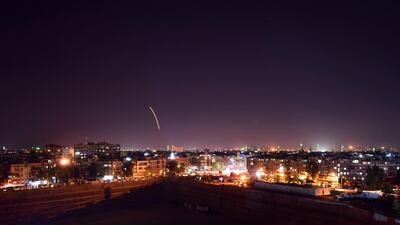Israeli Prime Minister Benjamin Netanyahu has admitted that its military was behind a missile attack near Damascus late on Friday.
Israel has struck Iranian, Hezbollah and Syrian targets in the neighbouring state on dozens of occasions, although Tel Aviv rarely admits openly to carryout out specific attacks.
"Only in the last 36 hours did the air force strike targets in Syria and we have proven that we will not stop the settlement of Iran in Syria," Mr Netanyahu said at a cabinet meeting on Sunday.
"The accumulation of recent attacks shows that we're more determined than ever to act against Iran in Syria, just as we promised."
Syrian state media said the military's air defences shot down Israeli missiles.
A Syrian war monitor based in Britain said that two areas were targeted that were hosting forces attributed to Iran and Lebanese Shiite movement Hezbollah.
"We have operated with impressive success in thwarting Iran from establishing a military foothold in Syria, in the framework of which the military has struck hundreds of times against Iranian and Hezbollah targets," Mr Netanyahu said.
In February last year, Syrian anti-aircraft missiles downed an Israeli F-16 fighter jet carrying out a raid over Damascus. The jet crashed in northern Israel and both pilots parachuted out before the impact. It was the first Israeli jet to be downed since 1982 and Hezbollah championed it as the start of “a new strategic phase.”
______________
Read more:
Israel says it has found all of Hezbollah's cross-border tunnels
Gaza protests: Palestinians mourn woman killed by Israeli fire
Syria says air defences shoot down Israeli missiles
______________
Israel has until now generally refrained from commenting about the strikes for fear of triggering a reaction and being drawn into the deadly fighting in neighbouring Syria's civil war.
Last September, Israeli Intelligence Minister Israel Katz used a speech to give a rare insight into the country’s Syria campaign. He said the military had carried out over 200 strikes in Syria over the preceding year and a half. It has been clear about preventing the build-up of Iranian proxy forces near the Israeli occupied Golan Heights and the transfer of sophisticated missiles and equipment to the Tehran-backed Hezbollah.
Many of them have been in the area south of Damascus. Israel rarely comments on its operations so Mr Netanyahu's admission is rare.
Only recently has it begun to speak publicly about thwarting the weapons shipments from Iran through Syria into Lebanon. Israel's outgoing military chief, Lt Gen Gadi Eisenkot, did so over the weekend in various interviews.
In a New York Times interview published Friday, Lt Gen Eisenkot – the man who is credited with marshalling Israel’s Syria campaign against Hezbollah and Iran – revealed the government approved his shift in strategy in January 2017 to step up airstrikes in Syria. In 2018 alone, he said Israel's air force dropped 2,000 bombs in Syria.

